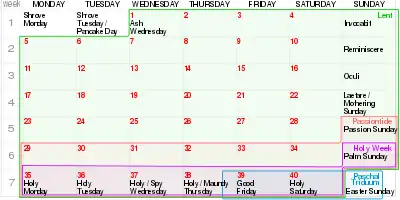Shrove Monday
Shrove Monday, sometimes known as Collop Monday, Rose Monday, Merry Monday or Hall Monday, is a Christian observance falling on the Monday before Ash Wednesday every year.[1] A part of the English traditional Shrovetide celebrations of the week before Lent, the Monday precedes Shrove Tuesday. As the Monday before Ash Wednesday, it is part of diverse Carnival celebrations which take place in many parts of the Christian world, from Greece, to Germany, to the Mardi Gras and Carnival of the Americas.
| Shrove Monday | |
|---|---|
| Date | Monday before Ash Wednesday |
| 2020 date | February 24 |
| 2021 date | February 15 |
| 2022 date | February 28 |
| 2023 date | February 20 |
| Frequency | annual |

Shrovetide
The word shrove is the past tense of the English verb shrive, which means to obtain absolution for one's sins by way of confession and doing penance. Thus Shrovetide gets its name from the shriving that English Christians were expected to do prior to receiving absolution immediately before Lent begins. Shrove Tuesday is the last day of "shrovetide", somewhat analogous to the Carnival tradition that developed separately in countries of Latin Europe. The terms "Shrove Monday" and "Shrove Tuesday" are no longer widely used in the United States or Canada outside of liturgical traditions, such as in the Lutheran, Anglican, and Roman Catholic Churches.[2][3]
Collop Monday
The British name Collop Monday is after the traditional dish of the day, consisting of slices of leftover meat (collops of bacon) along with eggs.[4] It is eaten for breakfast and is part of the traditional Lenten preparations. In addition to providing a little meat, the collops were also the source of the fat for the following day's pancakes.[5]
In east Cornwall, it is sometimes called Peasen Monday or Paisen Monday after the custom of eating pea soup on that day.[6]
German carnivals
Shrove Monday is part of the German, Danish, and Austrian Carnival calendar, called Rosenmontag. In the Rhineland, as part of the pre-lenten Fasching festival (or Feast of Fools), it is part of the parade season, a day of marching, revelry, and satirical floats.[7] In the Carnival in Denmark, it is called Fastelavn.
Eastern Orthodox traditions
In the Eastern Orthodox liturgical calendar (most years falling later than the Western Church, usually in March), the start of (Eastern) Lent is called Clean Monday. This is not identical to Shrove Monday, which precedes the start of (Western) Lent by two days. Clean Monday is the first day of "Great Lent", and is traditionally considered the beginning of spring in Greece and Cyprus, where it is a Bank Holiday.[8] Different traditions take place in different localities. In the town of Tyrnavos, for instance, feasts are followed by songs and dances with Bacchic overtones.[9]
Caribbean
In the 19th-century Trinidad and Tobago Carnival, a kambule (procession of people holding torches) took place in the earliest hours of Shrove Monday.[10]
Lundi Gras
The Shrove Monday events of the New Orleans and Mississippi Gulf Coast Mardi Gras, dating back to the 19th century, have since the late 20th century been named Lundi Gras ("Fat Monday").
See also
References
- "Shrove Monday". Merriam-Webster Dictionary.
- Walker, Sue (2002). "Mardi Gras". St. James Encyclopedia of Pop Culture. Retrieved 17 November 2006.
- "National Celebrations: Holidays in the United States". U.S. State Department. Archived from the original on 16 November 2006. Retrieved 17 November 2006.
- Brand, John (1849). Observations on popular antiquities of Great Britain. London: Henry G. Bohn. p. 62. Retrieved 10 February 2013.
- Timbs, John (1829). The Mirror of Literature, Amusement, and Instruction. London: J. Limbird. p. 133. Retrieved 10 February 2013.
-
- Tony Deane & Tony Shaw, Folklore of Cornwall (The History Press, 2009), p. 152.
- Margaret Ann Courtney, Cornish Feasts and Folk-lore (Beare & Son: 1890 (revised and reprinted from The Folklore Society Journals, 1886–87)), p. 21.
- Karneval revellers brave chilly rain for Rosenmontag parade. AFP/thelocal.de 23 February 2009. Retrieved 24 February 2009
- bank-holidays.com. Retrieved 24 February 2009
- Shrove Monday in the town of Tyrnavos. agrotravel.gr Retrieved 24 February 2009
- Maureen Warner-Lewis, Central Africa in the Caribbean: Transcending Time, Transforming Cultures (University of the West Indies Press, 2003), p. 221.